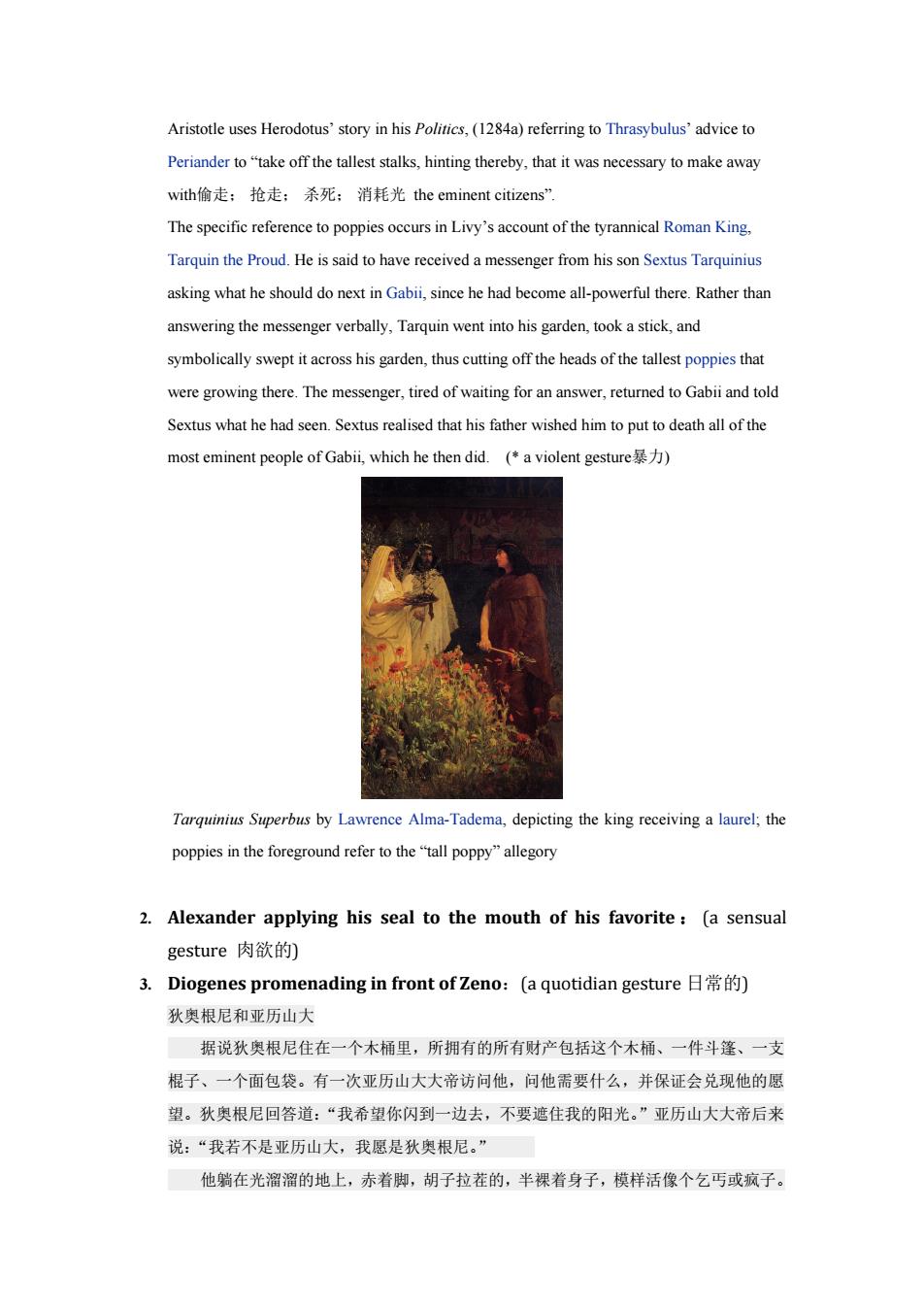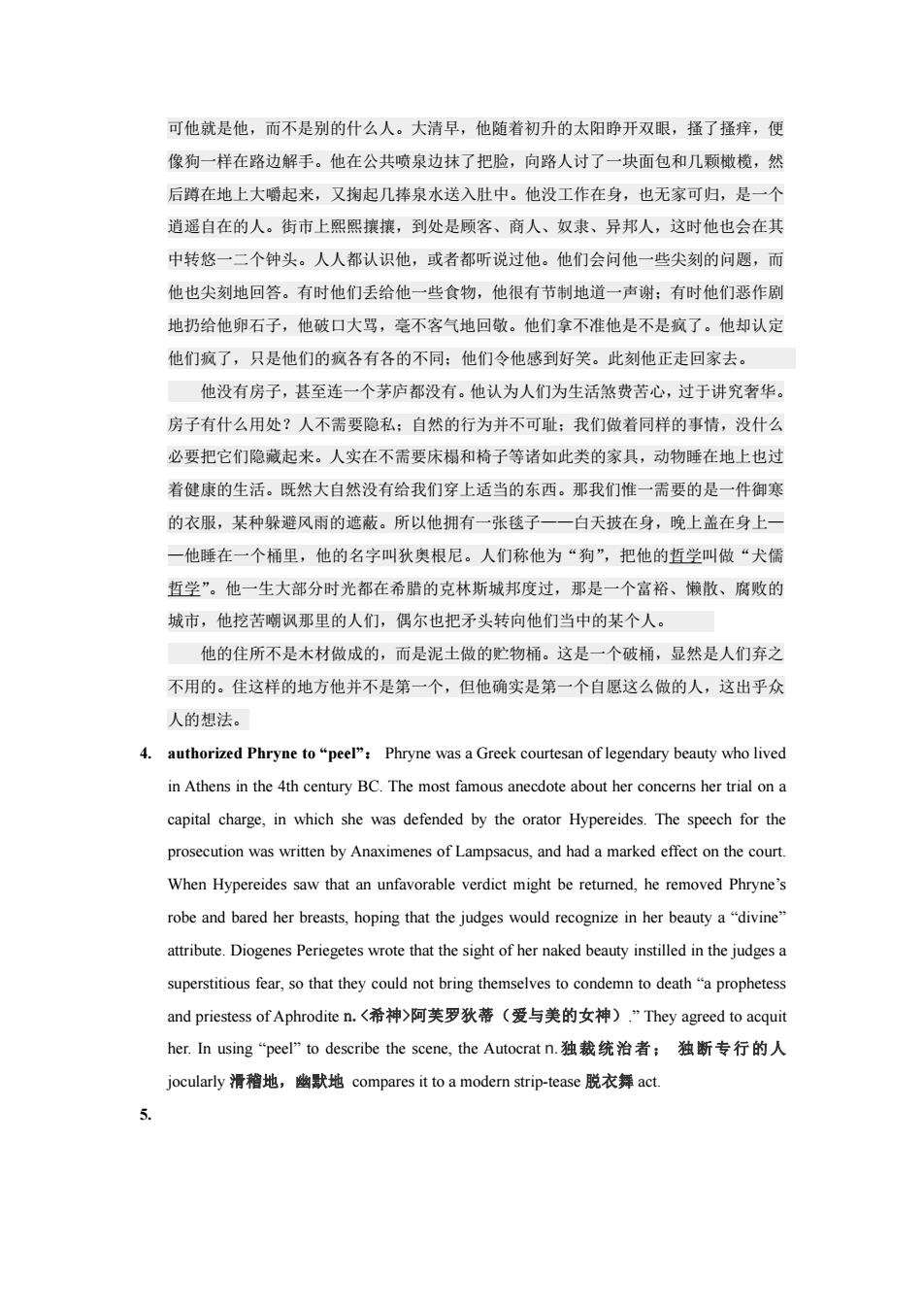
Allusions in“On the Various Means” 1.Tall poppy syndrome(TPS)is a pejorative term primarily used in the UK,Canada,Australia, New Zealand and other Anglosphere nations to describe a social phenomenon in which people of genuine merit are resented,attacked,cut down,or criticised because their talents or achievements elevate them above or distinguish them from their peers..高大罂粟花综合症 (Tall Poppy Syndrome)是澳大利亚和新西兰的一个流行用语,用来形容一种在社群文 化中,集体地对某类人的批判态度,属于意识形态表达的一种方式。当任何一个人在社 会上达到某程度上成功的时候,而惹来社群中不约而同的,自发性的,集体性的批评。 通常,这种批评也会从社区领袖们口中而出,亦带有反智主义,特别是对知识分子的怀 疑和鄙视。 Australia's usage of the term has evolved and is not uniformly negative.In Australia,a long history of"underdog"culture and profound respect for humility in contrast to that of Australia's English feudal heritage results in a different understanding of"Tall Poppy Syndrome'”. The term originates from accounts in Herodotus'The Histories(Book 5,92f),Aristotle's Politics(1284a),and Livy's History of Rome,Book I.Herodotus,The Histories,Book 5, 92-f [Periander]had sent a herald to Thrasybulus and inquired in what way he would best and most safely govern his city.Thrasybulus led the man who had come from Periander outside the town,and entered into a sown field.As he walked through the wheat,continually asking why the messenger had come to him from Cypselus,he kept cutting off all the tallest ears of wheat which he could see,and throwing them away,until he had destroyed the best and richest part of the crop.Then,after passing through the place and speaking no word of counsel,he sent the herald away.When the herald returned to Cypselus,Periander desired to hear what counsel he brought,but the man said that Thrasybulus had given him none.The herald added that it was a strange man to whom he had been sent,a madman and a destroyer of his own possessions,telling Periander what he had seen Thrasybulus do.Periander. however,understood what had been done,and perceived that Thrasybulus had counselled him to slay those of his townsmen who were outstanding in influence or ability;with that he began to deal with his citizens in an evil manner
Allusions in “On the Various Means” 1. Tall poppy syndrome (TPS) is a pejorative term primarily used in the UK, Canada, Australia, New Zealand and other Anglosphere nations to describe a social phenomenon in which people of genuine merit are resented, attacked, cut down, or criticised because their talents or achievements elevate them above or distinguish them from their peers. 高大罂粟花综合症 (Tall Poppy Syndrome)是澳大利亚和新西兰的一个流行用语,用来形容一种在社群文 化中,集体地对某类人的批判态度,属于意识形态表达的一种方式。当任何一个人在社 会上达到某程度上成功的时候,而惹来社群中不约而同的,自发性的,集体性的批评。 通常,这种批评也会从社区领袖们口中而出,亦带有反智主义,特别是对知识分子的怀 疑和鄙视。 Australia’s usage of the term has evolved and is not uniformly negative. In Australia, a long history of “underdog” culture and profound respect for humility in contrast to that of Australia’s English feudal heritage results in a different understanding of “Tall Poppy Syndrome”. The term originates from accounts in Herodotus’ The Histories (Book 5, 92f), Aristotle’s Politics (1284a), and Livy’s History of Rome, Book I. Herodotus, The Histories, Book 5, 92-f: [Periander] had sent a herald to Thrasybulus and inquired in what way he would best and most safely govern his city. Thrasybulus led the man who had come from Periander outside the town, and entered into a sown field. As he walked through the wheat, continually asking why the messenger had come to him from Cypselus, he kept cutting off all the tallest ears of wheat which he could see, and throwing them away, until he had destroyed the best and richest part of the crop. Then, after passing through the place and speaking no word of counsel, he sent the herald away. When the herald returned to Cypselus, Periander desired to hear what counsel he brought, but the man said that Thrasybulus had given him none. The herald added that it was a strange man to whom he had been sent, a madman and a destroyer of his own possessions, telling Periander what he had seen Thrasybulus do. Periander, however, understood what had been done, and perceived that Thrasybulus had counselled him to slay those of his townsmen who were outstanding in influence or ability; with that he began to deal with his citizens in an evil manner

Aristotle uses Herodotus'story in his Politics,(1284a)referring to Thrasybulus'advice to Periander to"take off the tallest stalks,hinting thereby,that it was necessary to make away with偷走;抢走;杀死;消耗光the eminent citizens'” The specific reference to poppies occurs in Livy's account of the tyrannical Roman King, Tarquin the Proud.He is said to have received a messenger from his son Sextus Tarquinius asking what he should do next in Gabii,since he had become all-powerful there.Rather than answering the messenger verbally,Tarquin went into his garden,took a stick,and symbolically swept it across his garden,thus cutting off the heads of the tallest poppies that were growing there.The messenger,tired of waiting for an answer,returned to Gabii and told Sextus what he had seen.Sextus realised that his father wished him to put to death all of the most eminent people of Gabii,which he then did.(a violent gesture) Tarquinius Superbus by Lawrence Alma-Tadema,depicting the king receiving a laurel;the poppies in the foreground refer to the"tall poppy"allegory 2.Alexander applying his seal to the mouth of his favorite:(a sensual gesture肉欲的 3.Diogenes promenading in front of Zeno:(a quotidian gesture日常的) 狄奥根尼和亚历山大 据说狄奥根尼住在一个木桶里,所拥有的所有财产包括这个木桶、一件斗篷、一支 棍子、一个面包袋。有一次亚历山大大帝访问他,问他需要什么,并保证会兑现他的愿 望。狄奥根尼回答道:“我希望你闪到一边去,不要遮住我的阳光。”亚历山大大帝后来 说:“我若不是亚历山大,我愿是狄奥根尼。” 他躺在光溜溜的地上,赤着脚,胡子拉茬的,半裸着身子,模样活像个乞丐或疯子
Aristotle uses Herodotus’ story in his Politics, (1284a) referring to Thrasybulus’ advice to Periander to “take off the tallest stalks, hinting thereby, that it was necessary to make away with偷走; 抢走; 杀死; 消耗光 the eminent citizens”. The specific reference to poppies occurs in Livy’s account of the tyrannical Roman King, Tarquin the Proud. He is said to have received a messenger from his son Sextus Tarquinius asking what he should do next in Gabii, since he had become all-powerful there. Rather than answering the messenger verbally, Tarquin went into his garden, took a stick, and symbolically swept it across his garden, thus cutting off the heads of the tallest poppies that were growing there. The messenger, tired of waiting for an answer, returned to Gabii and told Sextus what he had seen. Sextus realised that his father wished him to put to death all of the most eminent people of Gabii, which he then did. (* a violent gesture暴力) Tarquinius Superbus by Lawrence Alma-Tadema, depicting the king receiving a laurel; the poppies in the foreground refer to the “tall poppy” allegory 2. Alexander applying his seal to the mouth of his favorite : (a sensual gesture 肉欲的) 3. Diogenes promenading in front of Zeno:(a quotidian gesture 日常的) 狄奥根尼和亚历山大 据说狄奥根尼住在一个木桶里,所拥有的所有财产包括这个木桶、一件斗篷、一支 棍子、一个面包袋。有一次亚历山大大帝访问他,问他需要什么,并保证会兑现他的愿 望。狄奥根尼回答道:“我希望你闪到一边去,不要遮住我的阳光。”亚历山大大帝后来 说:“我若不是亚历山大,我愿是狄奥根尼。” 他躺在光溜溜的地上,赤着脚,胡子拉茬的,半裸着身子,模样活像个乞丐或疯子

可他就是他,而不是别的什么人。大清早,他随着初升的太阳睁开双眼,搔了搔痒,便 像狗一样在路边解手。他在公共喷泉边抹了把脸,向路人讨了一块面包和几颗橄榄,然 后蹲在地上大嚼起来,又掬起几捧泉水送入肚中。他没工作在身,也无家可归,是一个 逍遥自在的人。街市上熙熙攘攘,到处是顾客、商人、奴隶、异邦人,这时他也会在其 中转悠一二个钟头。人人都认识他,或者都听说过他。他们会问他一些尖刻的问题,而 他也尖刻地回答。有时他们丢给他一些食物,他很有节制地道一声谢:有时他们恶作剧 地扔给他卵石子,他破口大骂,毫不客气地回敬。他们拿不准他是不是疯了。他却认定 他们疯了,只是他们的疯各有各的不同:他们令他感到好笑。此刻他正走回家去。 他没有房子,甚至连一个茅庐都没有。他认为人们为生活煞费苦心,过于讲究奢华。 房子有什么用处?人不需要隐私:自然的行为并不可耻:我们做着同样的事情,没什么 必要把它们隐藏起来。人实在不需要床榻和椅子等诸如此类的家具,动物睡在地上也过 着健康的生活。既然大自然没有给我们穿上适当的东西。那我们惟一需要的是一件御寒 的衣服,某种躲避风雨的遮蔽。所以他拥有一张毯子一一白天披在身,晚上盖在身上一 一他睡在一个桶里,他的名字叫狄奥根尼。人们称他为“狗”,把他的哲学叫做“犬儒 哲学”。他一生大部分时光都在希腊的克林斯城邦度过,那是一个富裕、懒散、腐败的 城市,他挖苦嘲讽那里的人们,偶尔也把矛头转向他们当中的某个人。 他的住所不是木材做成的,而是泥土做的贮物桶。这是一个破桶,显然是人们弃之 不用的。住这样的地方他并不是第一个,但他确实是第一个自愿这么做的人,这出乎众 人的想法。 4.authorized Phryne to "peel":Phryne was a Greek courtesan of legendary beauty who lived in Athens in the 4th century BC.The most famous anecdote about her concerns her trial on a capital charge,in which she was defended by the orator Hypereides.The speech for the prosecution was written by Anaximenes of Lampsacus,and had a marked effect on the court. When Hypereides saw that an unfavorable verdict might be returned,he removed Phryne's robe and bared her breasts,hoping that the judges would recognize in her beauty a"divine" attribute.Diogenes Periegetes wrote that the sight of her naked beauty instilled in the judges a superstitious fear,so that they could not bring themselves to condemn to death"a prophetess and priestess of Aphrodite n.〈希神>阿芙罗狄蒂(爱与美的女神),”They agreed to acquit her.n using“peel”to describe the scene,the Autocrat n.独裁统治者;独断专行的人 jocularly滑稽地,幽默地compares it to a modern strip-tease脱衣舞act. 5
可他就是他,而不是别的什么人。大清早,他随着初升的太阳睁开双眼,搔了搔痒,便 像狗一样在路边解手。他在公共喷泉边抹了把脸,向路人讨了一块面包和几颗橄榄,然 后蹲在地上大嚼起来,又掬起几捧泉水送入肚中。他没工作在身,也无家可归,是一个 逍遥自在的人。街市上熙熙攘攘,到处是顾客、商人、奴隶、异邦人,这时他也会在其 中转悠一二个钟头。人人都认识他,或者都听说过他。他们会问他一些尖刻的问题,而 他也尖刻地回答。有时他们丢给他一些食物,他很有节制地道一声谢;有时他们恶作剧 地扔给他卵石子,他破口大骂,毫不客气地回敬。他们拿不准他是不是疯了。他却认定 他们疯了,只是他们的疯各有各的不同;他们令他感到好笑。此刻他正走回家去。 他没有房子,甚至连一个茅庐都没有。他认为人们为生活煞费苦心,过于讲究奢华。 房子有什么用处?人不需要隐私;自然的行为并不可耻;我们做着同样的事情,没什么 必要把它们隐藏起来。人实在不需要床榻和椅子等诸如此类的家具,动物睡在地上也过 着健康的生活。既然大自然没有给我们穿上适当的东西。那我们惟一需要的是一件御寒 的衣服,某种躲避风雨的遮蔽。所以他拥有一张毯子——白天披在身,晚上盖在身上— —他睡在一个桶里,他的名字叫狄奥根尼。人们称他为“狗”,把他的哲学叫做“犬儒 哲学”。他一生大部分时光都在希腊的克林斯城邦度过,那是一个富裕、懒散、腐败的 城市,他挖苦嘲讽那里的人们,偶尔也把矛头转向他们当中的某个人。 他的住所不是木材做成的,而是泥土做的贮物桶。这是一个破桶,显然是人们弃之 不用的。住这样的地方他并不是第一个,但他确实是第一个自愿这么做的人,这出乎众 人的想法。 4. authorized Phryne to “peel”: Phryne was a Greek courtesan of legendary beauty who lived in Athens in the 4th century BC. The most famous anecdote about her concerns her trial on a capital charge, in which she was defended by the orator Hypereides. The speech for the prosecution was written by Anaximenes of Lampsacus, and had a marked effect on the court. When Hypereides saw that an unfavorable verdict might be returned, he removed Phryne’s robe and bared her breasts, hoping that the judges would recognize in her beauty a “divine” attribute. Diogenes Periegetes wrote that the sight of her naked beauty instilled in the judges a superstitious fear, so that they could not bring themselves to condemn to death “a prophetess and priestess of Aphrodite n.阿芙罗狄蒂(爱与美的女神).” They agreed to acquit her. In using “peel” to describe the scene, the Autocrat n.独裁统治者; 独断专行的人 jocularly 滑稽地,幽默地 compares it to a modern strip-tease 脱衣舞 act. 5